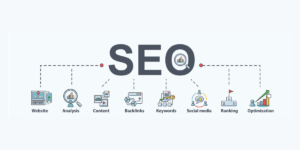
The average time people spend online every day is growing exponentially, with users in nearly a dozen countries breaching the eight-hour mark in 2021. Online transactions have the benefit of convenience—you can shop, make travel and hotel reservations, pay bills, connect with family and friends, work with colleagues all over the world, and so much more.
The internet population is in billions, and the digital landscape is constantly evolving. With this comes endless developments from the biggest names in tech. One excellent example is the metaverse.
Tech enthusiasts worldwide are creating virtual versions of themselves as they play online games. Add the craze over cryptocurrencies and NFTs, and you can observe the rapid rise of the metaverse right in your internet neighborhood.
According to experts, the metaverse is more immersive than anything else online. It will make it possible for people to go to a beach and meet with friends, coworkers, and family, or go for a meeting at a space station without leaving the house.
You can create a virtual version of yourself, an “avatar” that is your exact digital replica. Your digital twin can then live in the metaverse, doing the same things you do in the real world, but teleporting to places as quickly as you visit a website, transact business in virtual reality, and pay using virtual money.
All you need is an augmented reality (AR) or virtual reality (VR) headset, and you can explore all you want!
The Metaverse And Perception
Many are wondering what the metaverse will mean for real-life interactions. What will be the ramifications once the metaverse takes shape and becomes a vital part of our lives?
Today, people are still dubious about how much artificial intelligence, automation, and robotics will affect the building blocks of humanity. There is great concern about whether technology will (or can, or should) replace humans in the workplace and whether humans will live entirely in a virtual world, similar to The Matrix.
And with multi-million dollar companies such as Meta (formerly Facebook), Microsoft, Roblox, and AdobeSystems investing in the metaverse, the interest and concern have only increased. Billions of people use technology developed by these companies and are curious about how these changes in the digital landscape will impact their real lives.
These companies are investing in new technologies that are changing how people interact online. They are using technology to impact how the general public can perceive individuals, groups, and even whole countries. The spread of fake news worldwide is one example of how perceptions are affected and changed because of digital technology.
Virtual Money, Virtual Investments?
The popularity of Bitcoin and cryptocurrencies has also increased people’s interest in the metaverse. These digital currencies leverage cryptography to safeguard transactions and use a decentralized system to record movement.
As of today, cryptocurrency is not under any regulating authority.
The best example of cryptocurrency is Bitcoin. Bitcoins are digital currency not under the control of any bank or specific nation. It runs on blockchain software and relies on encryption techniques to control the creation of digital currency and verify transactions.
With the recent rapid rise and collapse of bitcoin and other cryptocurrency values, many are pondering whether it is a bubble or a volatile investment that investors and the general public should be wary of. And if cryptocurrencies become the chosen digital money in the metaverse, would they have the same value that it does in the real world?
NFTs In The Metaverse
Reports that a man bought an NFT of Twitter co-founder Jack Dorsey’s first tweet for $2.9 million made headlines worldwide. But the more concerning news was that the same NFT lost its value as soon as it was bought.
A non-fungible token (NFT) is a digital product similar to cryptocurrency. NFTs can be considered investments; however, they cannot be traded or used as currency. NFTs contain specific data and can be sold just like art, cars, or in this case, an image of a tweet.
In the metaverse, NFTs allow people to own these investments, similar to real estate, cars, or any kind of property in the real world. And just like in the real world, their values do not remain static—they can rise and fall, and with this example, the fall could be so much that it could lead to the loss of millions.
Today, NFTs remain a questionable investment for many. It can be challenging to comprehend or accept that digital data arranged in a certain way to create an image would have the same value as an actual painting, car, or an entire house.
For now, people largely use NFTs to represent real-life objects. They are used to make online transactions easier and enable automated payments and decentralized services.
It will still take some time for NFTs to have the same value as real objects, and the general public still has a muddled understanding of what NFTs could mean to their portfolios.
How The Metaverse Could Impact You
All of this still begs the question: if the metaverse becomes a reality, how can it impact the ordinary person?
Some experts see positive outcomes with the full development of the metaverse. Work will become more like play, companies will become more open and collaborative, and it will become easier to share creativity and imagination with friends and family.
The number of companies investing in the metaverse promises thousands of jobs. It makes it possible for employees to work wherever they may be, whatever their condition—the metaverse will allow them to participate, collaborate, plan, and meet with ease.
However, there are also concerns about whether there will be a dissonance between reality and the metaverse. People spending too much time in the metaverse might feel underwhelmed when they return to reality. They may expect the same rules to apply in real life as in the metaverse. They may feel disoriented and unbalanced, or even disengaged with their real lives.
This could harm people’s mental and emotional health. Disconnecting from nature can lead to isolation, which is a step toward disconnection and depression. Two years of virtual interactions have shown that many people experience weariness using technology for prolonged periods, and the idea of further immersion in a virtual world is not an exciting thought for them.
Furthermore, there are concerns about security, with hackers using malware to steal identities, data, and even digital currency. This latest technology allows people to change their physical appearance and leverage data for their benefit—even with malicious intent. There are concerns about how much encryption and security software can truly protect people and how much it would cost to maintain these protective measures when in the metaverse.
Is The Metaverse The Future?
Though the full development of the metaverse is still far into the future, we are standing on the threshold of its many possibilities: global social media, digital manipulation of images, simulated realities and virtual locations, and digital currency that uses encryption and automation to protect real-life assets and investments.
But many are still concerned about why these multi-million companies are pushing for the creation of the metaverse. What would it mean for the ordinary person to be involved in the economy of augmented reality and the metaverse? How will this affect the things people treasure in real life?
For now, we need more time to track these developments before we step over the threshold to face our future.

My name is Sam Cotto, I live on Long Island and I’m the owner of Natural Health Planner (naturalhealthplanner.com), most of my articles pertain to healthy living, I hope you enjoy my articles and check out my Natural Health website!











